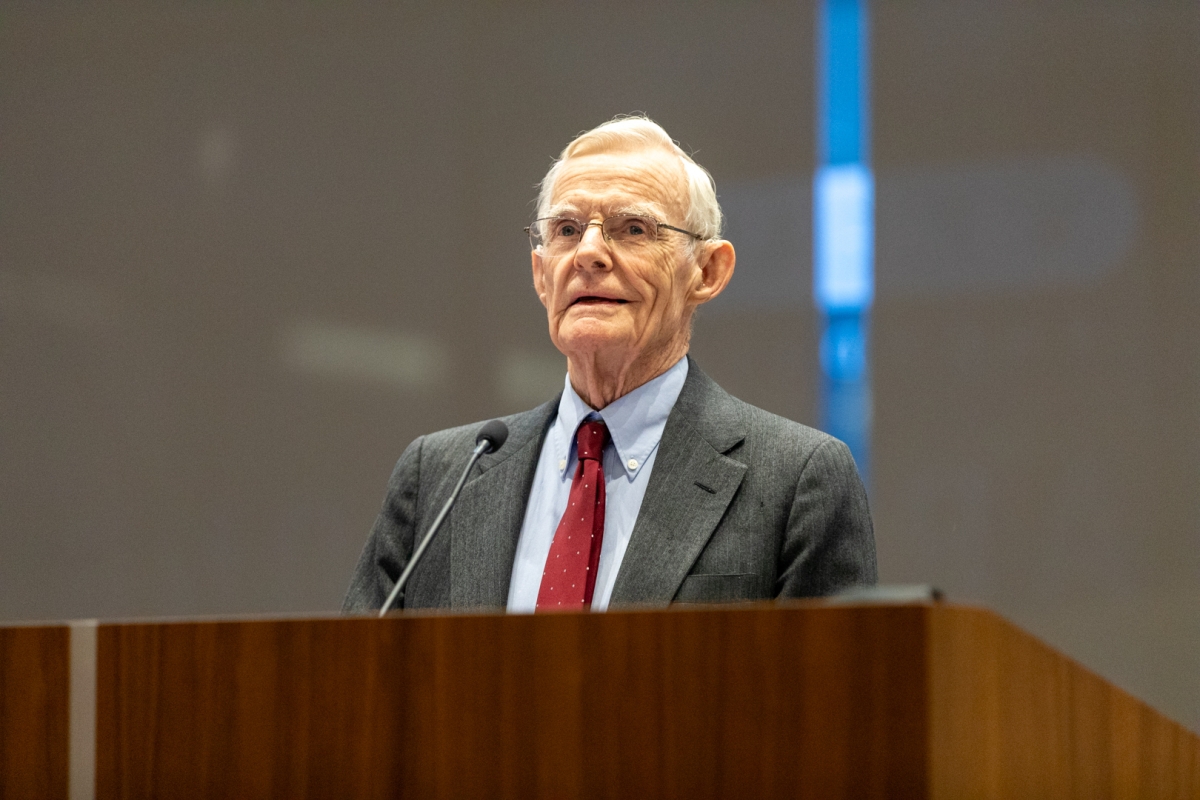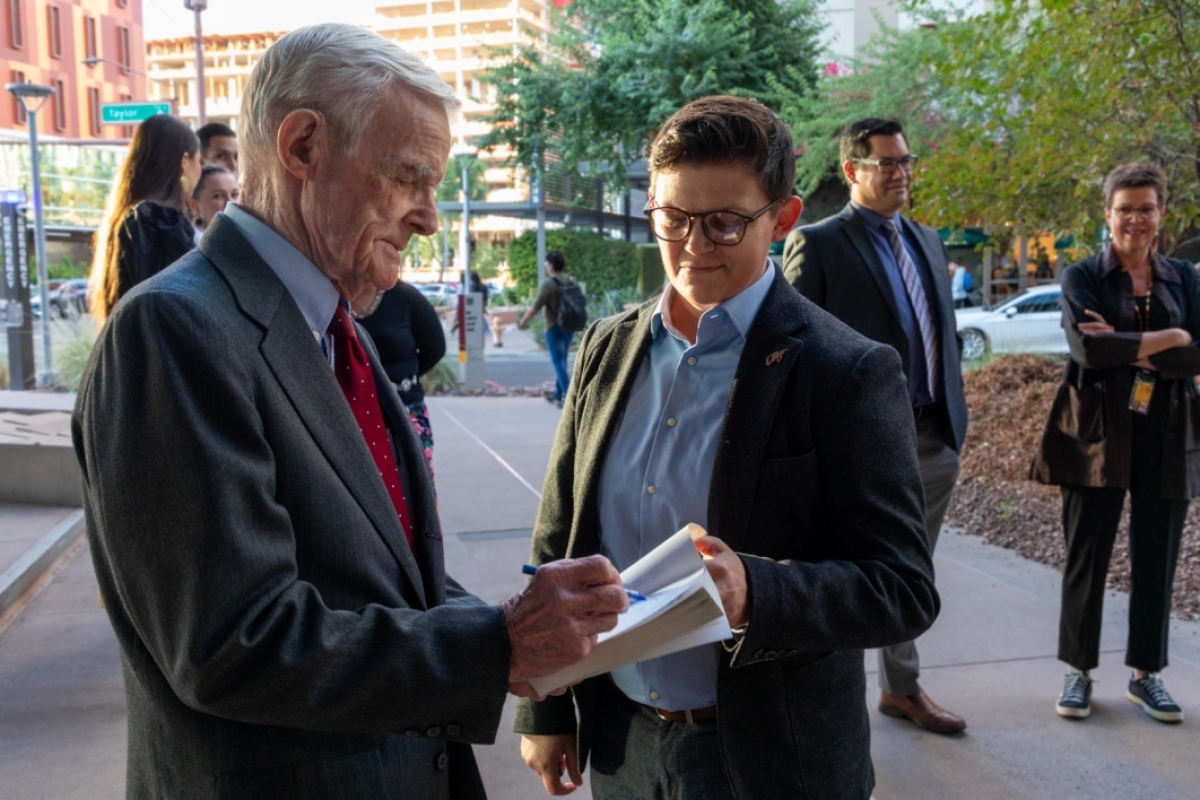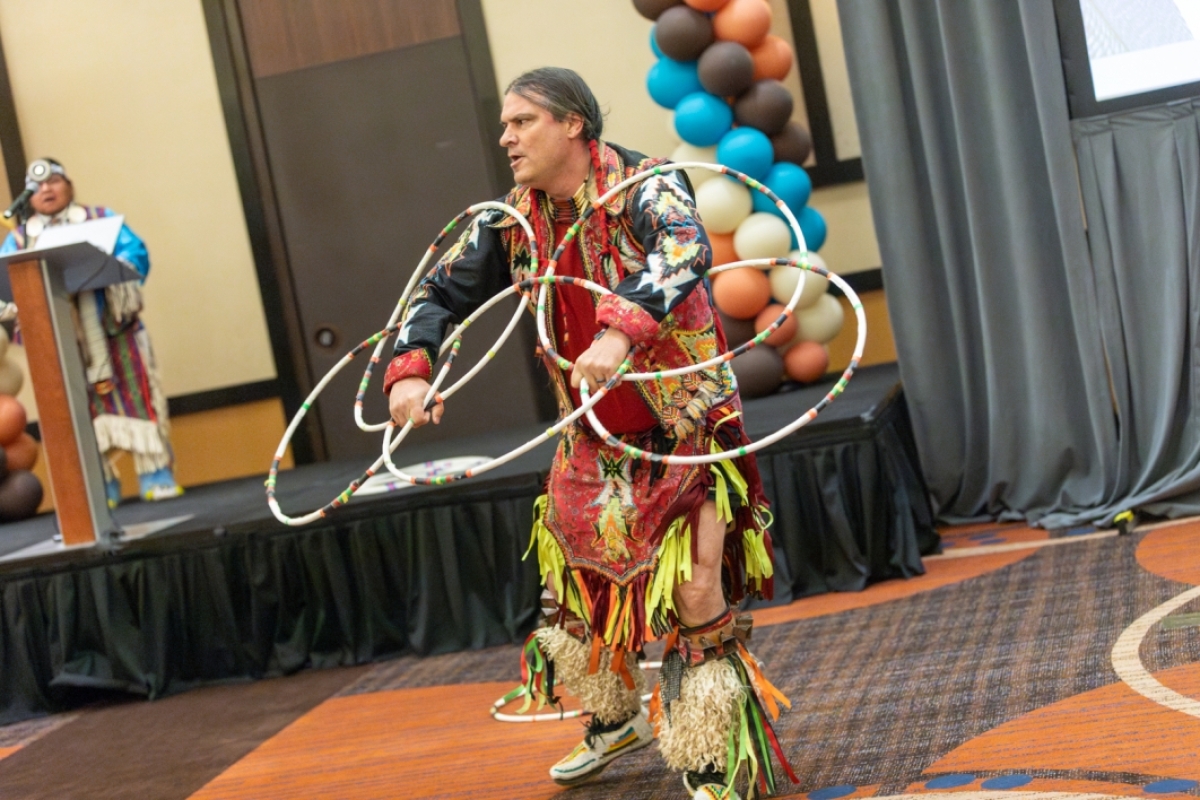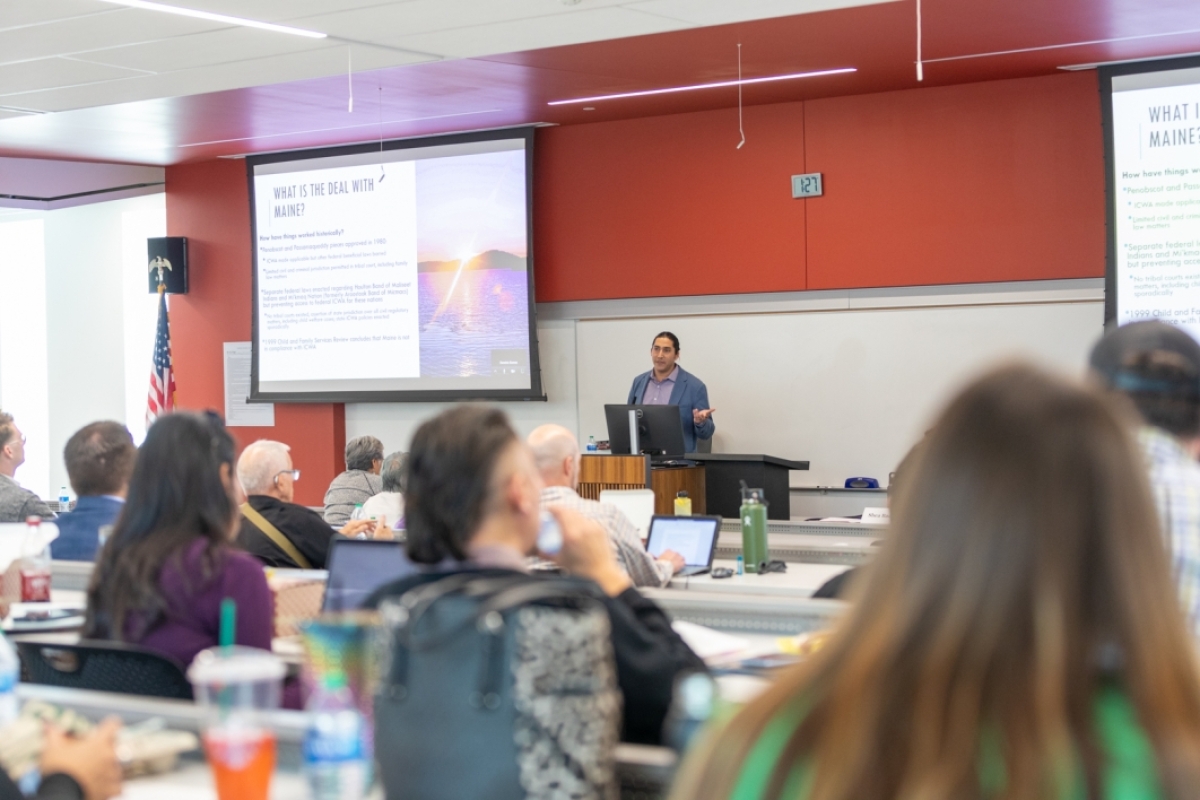ASU's Indian Legal Program grows into nationally recognized institution
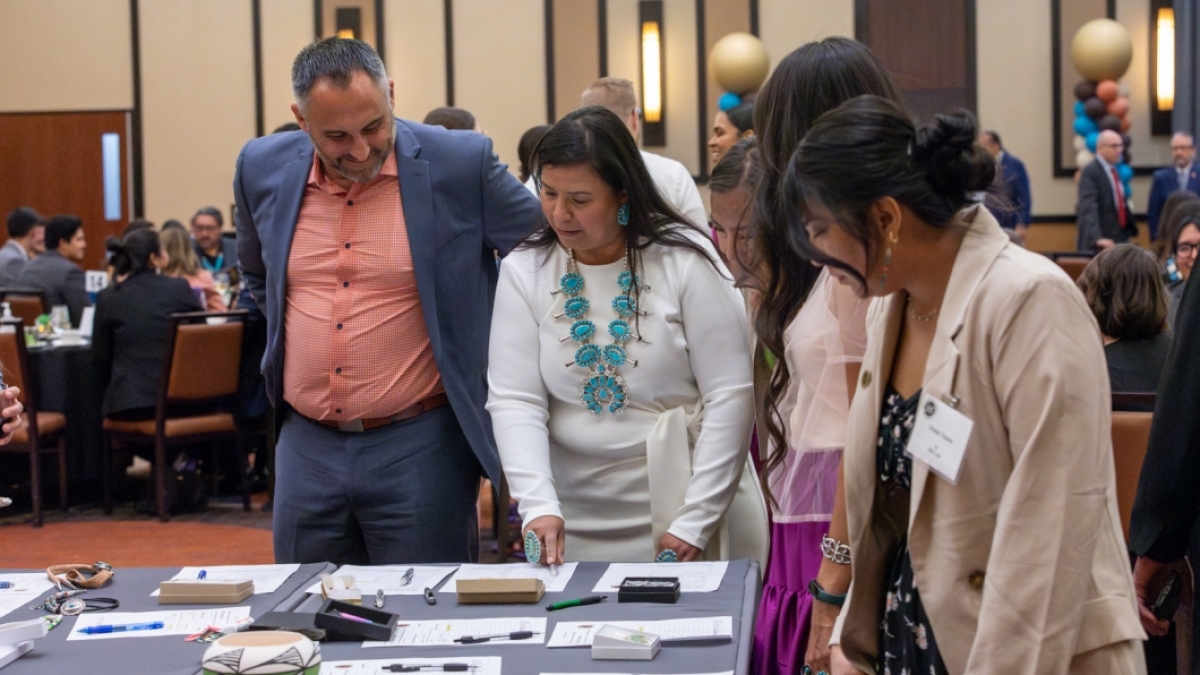
The second day of the anniversary celebrations for the Indian Legal Program included a Nov. 10 dinner and silent auction. All proceeds went to support Indian Legal Program students with scholarships. Photo by Tabbs Mosier/ASU
When William C. Canby Jr. looks back at Arizona State University’s Indian Legal Program's humble beginnings, he openly marvels at how far it has come.
“When I first came to ASU, the law school had six professors on staff and our faculty meetings were held at a small table at a hotel coffee shop on Apache Boulevard,” said Canby, a senior judge for the United States Court of Appeals for the Ninth Circuit and a founding faculty member of the Sandra Day O’Connor College of Law and the Indian Legal Program.
“It’s become quite an institution since then," he said. "This program has grown in so many ways. They have more resources, there’s more outreach and they are attracting great students to practice Indian law to populations around the country. I’ve been so lucky to see it come to fruition.”
Canby was the centerpiece of the Indian Legal Program’s 35th anniversary, which kicked off with his Nov. 9 presentation “Indian Law Today and Tomorrow, From a Long-Term Perspective.” His lecture was part of a three-day celebration that included a legal education session, dinner and silent auction, and a golf tournament to raise money for a variety of student scholarships and endowments.
“The ILP is proud to honor Judge Canby through this annual law school lecture,” said Kate Rosier, executive director of the Indian Legal Program. “Judge Canby, a founding faculty member of the law school, was the first person to teach Indian law at ASU. Through his teaching and his early partnerships with tribal governments, he laid the foundation for the strong program we have become.”
The annual lecture was started in 2007 to honor the 92-year-old Canby, who served two years as an U.S. Air Force judge, clerked for Associate Justice Charles Evans Whittaker on the U.S. Supreme Court, spent a few years in the Peace Corps in Africa, was a special assistant to Sen. Walter Mondale, and was an assistant to Harris Wofford, president of State University of New York at Old Westbury. In 1980, President Jimmy Carter appointed Canby to the Ninth Circuit Court.
“Judge Canby is a giant in Indian law as he was the second person in the United States to teach Indian Law at a university,” said Robert J. Miller, faculty director of the Rosette LLP American Indian Economic Development Program and a professor at ASU Law. “He has visited tribes around the state and got them to work with ASU. His book, 'American Indian Law in a Nutshell,' has been read by every law school student and judge in the field, which is going into its eighth edition. He is also the founding member of the leading Indian law program in the country, and is still going strong.”
Canby said he stumbled upon his legal niche fortuitously, and quite by accident.
“I was hired by Dean Willard H. Pedrick, who had been at ASU for a year and trying to get things set up. I was told to get here by July 1, so he could go on vacation but have someone watching the shop while he was away. He was going to make me acting associate dean for a month,” Canby said. “I wasn’t here but a week when someone from the regional office of the Bureau of Indian Affairs came to Tempe. He wanted to bring tribal judges from Arizona, Utah and Nevada here and have someone give them a day’s instruction to give them some general instruction on law. I said, ‘I’ll do it.’”
Canby and the judges met eight to nine times a year for several years. In 1971, Warren Cohen joined the faculty, and together, the duo created the informal Office of Indian Law. Under this name, they began to increase outreach and foster relationships with tribes, often funding their activities from their own pockets. The relationship grew and tribes began to seek out advice and guidance from the program.
“Judge Canby saw a need with tribes with their codes and their courts and he agreed to meet with them on these issues and worked with their communities,” said Patty Ferguson-Bohnee, Indian Legal Program faculty director and a clinical professor of law. “He saw a need for public service to tribal governance and he met it. Ever since then, the ILP has hired dedicated faculty to educate Native students and others who are interested in Indian law.”
In 1988, the Indian Legal Program was accredited by ASU President J. Russell Nelson, giving birth to the official name. The program moved to ASU’s Downtown Phoenix campus and has been housed in the $130 million Beus Center for Law and Society since 2016.
“This is the seventh academic year we’ve been able to work in this beautiful law school building,” said Stacy Leeds, Willard H. Pedrick Dean and Regents Professor of Law at the O’Connor College of Law. “But it’s not just the law school and the physical space that distinguishes us from our peers. We are so fortunate to have grown but also sustain what is undoubtedly the nation’s best Indian law program.”
Today the program's faculty includes 10 professors (six of whom are full-time Native American law professors), three faculty associates and seven staff members. Through their expertise, they offer a variety of degrees and law certificates, as well as hosting national conferences, workshops, lectures, presentations and community outreach programs.
The Indian Legal Program is also the home of the Indian Legal Clinic, Tribal Court Trial Skills College, Pathway to Law Initiative, Continuing Legal Education courses, the Rosette, LLP American Indian Economic Development Program and the ILP Washington, D.C. Experience, which offers students an opportunity to take classes for a full semester in the nation’s capital.
To date, the program has graduated approximately 400 students, representing 151 tribes. Some of the more notable graduates include Benjamin Hanley, who served 13 two-year terms to the Arizona State House of Representatives; Claudeen Bates Arthur, the first Navajo woman licensed as a lawyer in the United States and first female chief justice of the Navajo Supreme Court; Diane Humetewa, a U.S. District Court judge and the first Native American woman and enrolled tribe member to serve as a federal judge.
In 2010, Derrick Beetso joined that list of distinguished graduates.
“As an alum, I always thought that some point in my career I might come back to ASU and transition back into academia,” said Beetso, director of the the program's Indian gaming and self-governance programs, and a professor of practice at ASU Law. “We have an opportunity to provide to a broad spectrum of students from very talented faculty. When I think of Judge Canby and the Indian Legal Program, it reminds me of that old saying: We stand on the shoulders of giants.”
More Law, journalism and politics
Can elections results be counted quickly yet reliably?
Election results that are released as quickly as the public demands but are reliable enough to earn wide acceptance may not always be possible.At least that's what a bipartisan panel of elections…
Spring break trip to Hawaiʻi provides insight into Indigenous law
A group of Arizona State University law students spent a week in Hawaiʻi for spring break. And while they did take in some of the sites, sounds and tastes of the tropical destination, the trip…

LA journalists and officials gather to connect and salute fire coverage
Recognition of Los Angeles-area media coverage of the region’s January wildfires was the primary message as hundreds gathered at ASU California Center Broadway for an annual convening of journalists…


